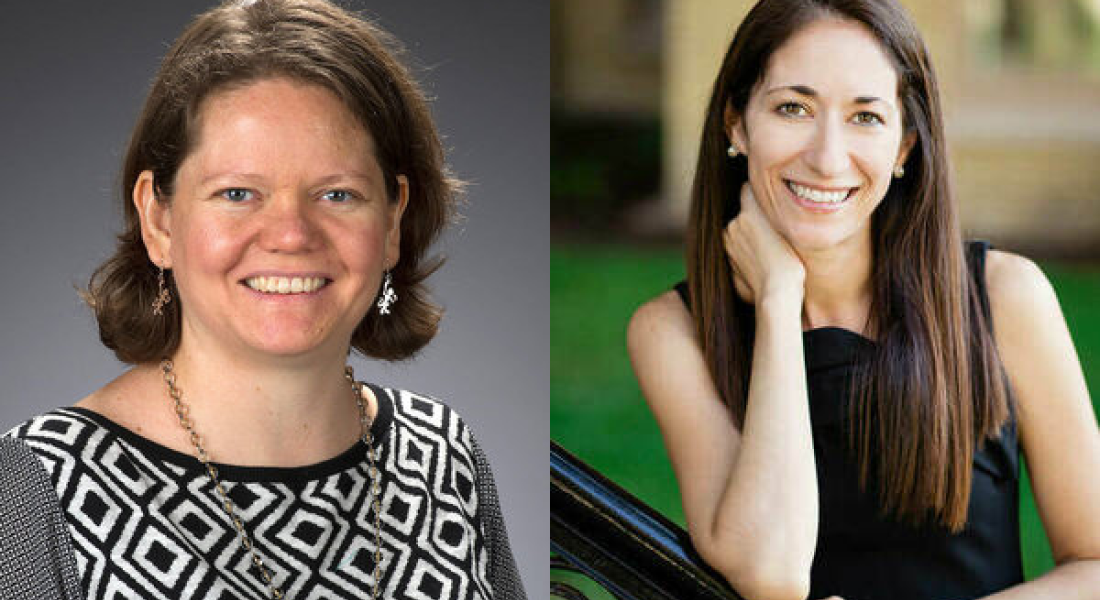
Two Kellogg faculty fellows have won a three-year grant from Humanities Without Walls, a consortium that supports collaborative research and scholarship, for a project that will encourage Latinx women who have suffered violence during pregnancy and childbirth to share their experiences through art and literature.
"The Latinx Obstetric Violence Project: Art and Literature as Tools of Reciprocal and Redistributive Knowledge" will be led by Vanesa Miseres, an associate professor of Spanish in the Department of Romance Languages and Literatures, and Vania Smith-Oka, an associate professor in the Department of Anthropology. The project seeks to empower Latinx mothers in the South Bend area who often experience disrespect or abuse by medical professionals throughout the birthing process to share their stories through creative expression.
“Art and literature function as languages with which Latinx women can narrate and share their birth experiences,” Miseres and Smith-Oka wrote in their proposal. “We believe that their works in literature and the visual arts can facilitate deeper knowledge of harm, healing, and prevention in the community and around obstetric violence.”
Miseres, who has studied artistic and literary representations of obstetric violence in Latin America, and Smith-Oka, whose research in the study of birthing and maternal care in Mexico has been supported by Kellogg through the years, began talking about their common interest in these topics.
Those conversations grew more frequent when the Reilly Center for Science, Technology, and Values launched its interdisciplinary Health, Humanities, and Society program, which Smith-Oka directs. In studying health from multiple perspectives, HHS involves analyzing the humanistic and social aspects of medicine, including systems and cultural practices that shape how health, illness, and healing are experienced.
“Art and literature function as languages with which Latinx women can narrate and share their birth experiences. We believe that their works in literature and the visual arts can facilitate deeper knowledge of harm, healing, and prevention in the community and around obstetric violence.”
With support and guidance from the Institute for Scholarship in the Liberal Arts, Miseres and Smith-Oka developed a plan for art and literature workshops, led by invited Latinx and Latin American artists whose works touch on motherhood and obstetric violence. These sessions will encourage women to share their experiences through poems, short essays, drawings, paintings, embroidery, and more, calling attention to obstetric violence and the impact it has on mothers.
“During this pandemic time, we have learned about the importance of bringing the human factor into consideration when discussing science and its impact on society,” said Miseres, who is also a research faculty of the Gender Studies Program and a fellow of the Nanovic Institute for European Studies.“I hope our project can show the community the positive bridges that we can build between humanities and the sciences. And, more importantly, I hope this project can bring women in the community together, empower them through their own experiences navigating the medical system at the time of giving birth, and reveal the tools that literature and the arts can provide to accompany and reflect this process.”
Miseres and Smith-Oka see these creative opportunities as a way to shine a light on the hierarchical nature of relationships between women and health professionals, and how that power dynamic often leads to obstetric violence. Latinx women who give birth in US hospitals are particularly vulnerable, they said, and often lead to disrespect or abuse.
Their proposal was selected for funding from a pool of 37 applicants in HWW’s Grand Research Challenge, which emphasizes reciprocity and redistribution – methods that engage community collaborators in equal and ethical partnerships with researchers and foster new forms of partnerships between faculty, students, and staff.
Miseres and Smith-Oka will partner with South Bend nonprofit La Casa de Amistad and executive director Juan Constantino, as well as Notre Dame PhD students Simona Spiegel (Anthropology) and Ignacio Sánchez Osores (Spanish).
“This HWW project is a wonderful opportunity to bring in different voices and perspectives, especially on how to provide Latinx women in South Bend the space to talk about their experiences and transform their narratives into artistic expression,” said Smith-Oka, who also is a faculty fellow of the Eck Institute for Global Health. “I am excited that this endeavor will involve faculty and graduate students from different disciplines, as well as a community partner who will help us further develop a connection between Notre Dame and South Bend that is deep, egalitarian, and reciprocal.”





